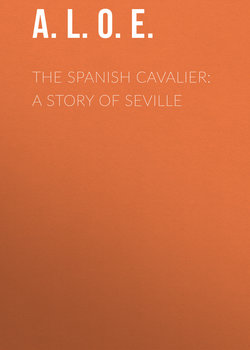The Spanish Cavalier: A Story of Seville

Реклама. ООО «ЛитРес», ИНН: 7719571260.
Оглавление
A. L. O. E.. The Spanish Cavalier: A Story of Seville
CHAPTER I. THE COUNTING-HOUSE
CHAPTER II. A SAUNTER THROUGH SEVILLE
CHAPTER III. FADED SPLENDOUR
CHAPTER IV. PRIDE AND ITS PENALTY
CHAPTER V. ANNOUNCEMENTS
CHAPTER VI. A SISTER'S SACRIFICE
CHAPTER VII. DRIVEN TO THE SLAUGHTER
CHAPTER VIII. WITHOUT AND WITHIN
CHAPTER IX. THE BRIEF FAREWELL
CHAPTER X. STRUCK DOWN
CHAPTER XI. FAILURE
CHAPTER XII. DARKNESS AND LIGHT
CHAPTER XIII. NEW LIFE
CHAPTER XIV. AN UNPARDONABLE WRONG
CHAPTER XV. CONFESSION
CHAPTER XVI. A MIRAGE
CHAPTER XVII. ARRESTED
CHAPTER XVIII. TURNED AWAY
CHAPTER XIX. WANDERING ALONE
CHAPTER XX. AN IDOL ON ITS PEDESTAL
CHAPTER XXI. TWO ANGELS
CHAPTER XXII. STRANGE COMPANY
CHAPTER XXIII. PREACHING IN PRISON
CHAPTER XXIV. A FRIEND
CHAPTER XXV. WARNINGS
CHAPTER XXVI. THE LONELY POSADA
CHAPTER XXVII. FOLLOWING SCENT
CHAPTER XXVIII. WANDERINGS
CHAPTER XXIX. THE EARTHQUAKE
CHAPTER XXX. PURSUED
CHAPTER XXXI. VENGEANCE
CHAPTER XXXII. A LAST FAREWELL
CHAPTER XXXIII. A TREASURE
CHAPTER XXXIV. GLAD TIDINGS
CHAPTER XXXV. FICTION AND TRUTH
Отрывок из книги
Lucius Lepine was the son of an officer of the royal navy. The youth had been eagerly and successfully pursuing a course of education in one of the public schools of England, when the sudden death of his father had deprived him of the means of completing it, and of leaving Rugby, as he had hoped to do, at the head of the school. The widowed mother of Lucius was left to support, on very slender means, a numerous family, of which he was the first-born. The youth's ambition had been to enter one of the universities, with a desire – as yet mentioned to no one – of preparing himself for the ministry of the Church. He now saw that the desire must be suppressed, the ambition relinquished. Lepine's first earthly object must be to become, not a burden, but a stay to his mother. Lucius had for some time exerted himself unsuccessfully to discover some means of earning independence, when a situation was offered to him in the firm of Messrs. Passmore and Perkins, which conducted an ironware factory in Seville. A boyish fancy, which had induced Lucius to acquire the Spanish language that he might read Don Quixote in the original, great intelligence, and a talent for keeping accounts, made the admiral's son peculiarly qualified to fill such a situation with credit to himself and advantage to his employers. Mr. Passmore's terms were liberal: he was at least good as a paymaster, whatever he might be as a man. Lucius did not hesitate long ere accepting the offer made to him. He took the "plunge" so bravely, and apparently cheerfully, that none, save perhaps his mother, guessed with what an inward shudder of repugnance it was made.
When thus separated from his family and all the companions of his youth, Lucius, who was of a genial temperament, looked around him for friends in what was to him a land of exile. He had had no letters of introduction, and the society of Mr. Passmore, the working head of the firm, and of a few merchants and manufacturers occasionally met with at his table, by no means satisfied the yearning of the young man's heart for intercourse with congenial spirits. The only person in Seville towards whom Lucius felt drawn by a feeling of sympathy was the stately young Spaniard, De Aguilera, – who had, like himself, been induced by liberal offers to accept a situation in the firm of Messrs. Passmore and Perkins. The aristocratic bearing of Don Alcala de Aguilera, his refined manners, his lofty courtesy, gave to him an interest in the mind of Lucius – an interest made up of mingled admiration, curiosity, and pity. The Spanish clerk, compared to his English employer, appeared to Lucius like a polished Toledo blade compared to a kitchen utensil. Lucius was occasionally reminded by the mien of his companion of other qualities of the rapier besides its exquisite polish. Insult, or what he deemed such, would make the Spaniard's dark eyes flash with an expression which told that his pride was not subdued, and that his anger might be dangerous. It was perhaps well that Mr. Passmore's inability to speak Spanish with anything approaching to fluency made him generally employ Lepine as the channel of communication between himself and De Aguilera. Many a dictatorial command or coarse reproof, uttered by Passmore, came softened from the lips of the English gentleman, – words which, if repeated in the tone in which they had first been spoken, would have made the haughty Spaniard lay his hand on his stiletto.
.....
The young Englishman would fain have sent in his card, and presented himself to the lady or ladies within, but shyness prevented his thus making an attempt to enter the house without a formal introduction. Lucius had seen little or nothing of society in the higher circles of Seville, and feared to give offence by some unintentional breach of its rules. The manner of Teresa would have shown a less intelligent observer than Lucius, that she at least would have resented and resisted as an intrusion any attempt on his part to venture within the archway. A little disappointed at his failure in procuring an interview with his friend, Lucius placed his card in the soiled, wrinkled hand of Teresa, to be given to her master on his return. With a lingering look through the vestibule into the beautiful patio beyond, the Englishman quitted the place.
In a state of high irritation, Teresa hurried through the passage into the court, taking care to close and lock the grating between them. With the air of a duenna who, having grown gray in service, thinks that she is privileged to say what she pleases, the old woman approached her young lady.
.....